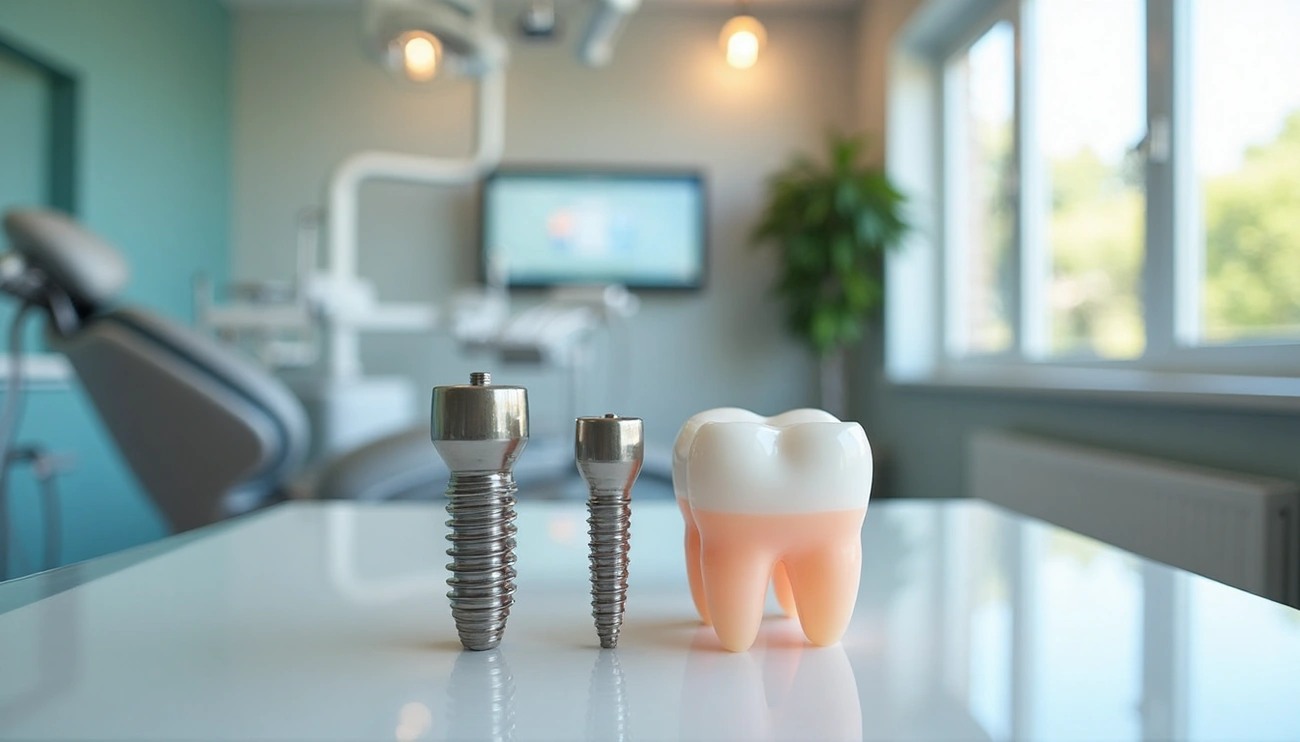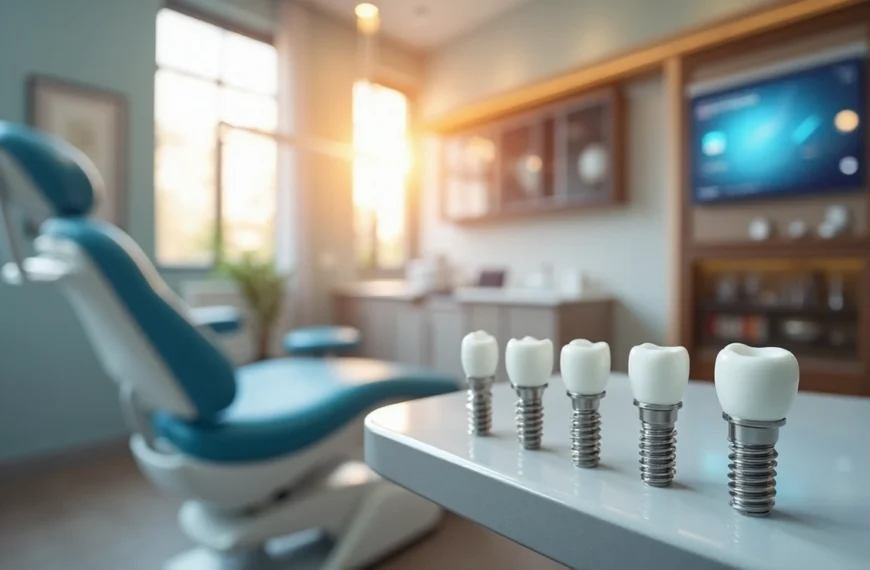The cost of new teeth varies widely. A single dental implant ranges from $1,500 to $6,000 in 2025. The price might shock you – full mouth restorations can reach $30,000 to $60,000 or more. This makes dental work a major financial commitment.
The advertised prices for new teeth might look reasonable at first. The actual cost goes well beyond the implant itself. You’ll need to factor in bone grafting that adds $500 to $3,000. Diagnostic tests and after-surgery care push the final cost even higher. Modern techniques like All-on-4® implants give you better value. These trailblazing solutions use carefully positioned implants to support a complete arch of teeth.
Let’s get into what dental implants really cost in 2025. We’ll break down both obvious and hidden expenses that affect your total investment. You’ll get clear facts about pricing factors instead of marketing promises. This information helps you make smart choices about your dental health.
What You’re Really Paying For With New Teeth
Dental implants are one of the most important investments you can make in your oral health. A clear understanding of their components helps explain why new teeth cost more than just paying to replace a tooth.
Implant post, abutment, and crown explained
Your complete dental implant system needs three main parts that each play a vital role:
- The implant post – This titanium or zirconia screw works as your new tooth root. A surgeon places it into your jawbone where it fuses with your natural bone through a process called osseointegration. This creates a stable foundation.
- The abutment – This connector piece attaches to the implant post after healing. It extends above your gumline and anchors your replacement tooth securely.
- The crown – This visible part looks just like a natural tooth. Made from porcelain, ceramic, or composite materials, it matches your other teeth’s color, shape, and size perfectly.
Each part needs specific manufacturing, materials, and expert care. These factors determine your new teeth now cost.
Why dental implants cost more than dentures or bridges
Your dental implants come with higher prices than other tooth replacement options, and with good reason too:
Longevity and durability – Dental implants can last a lifetime with proper care. Dentures or bridges need replacement every 5-10 years, which makes implants more budget-friendly over time.
Bone preservation – Your implants stimulate and protect jawbone health. This prevents bone loss that happens after losing teeth. All but one of these options – dentures and bridges – miss this vital benefit.
Comfort and functionality – These implants work just like your natural teeth. You can eat, speak, and smile without the common problems of slipping or uncomfortable dentures.
Specialized training – Implant procedures need advanced surgical expertise and special equipment. Many general dentists refer patients to oral surgeons or periodontists who have extra training.
The original cost of new teeth might seem high compared to other options. However, their exceptional durability and health benefits often provide better value as time passes.
How Much Is New Teeth in 2025?
Image Source: Smiles By Choice
Dental implant prices change by a lot based on how many teeth need replacement and what procedures you need. Let’s get into what tooth replacement options cost in 2025.
Single tooth: $1,500–$6,000
A single dental implant costs between $3,000 and $5,000. This price tag has the original consultation ($100-$200), implant placement surgery ($1,500-$2,000), abutment placement ($300-$500), and crown placement ($1,000-$2,000). Some places charge up to $7,000 for a single tooth implant.
Patients should know these prices might not cover all the work to be done. Bone grafting could add $200 to $3,000, and pulling teeth might cost $75 to $650 per tooth.
Multiple teeth: $3,000–$15,000
The final cost of new teeth depends on which option you pick for multiple neighboring teeth. Implant-supported bridges are a great way to get a better deal than individual implants. To name just one example, replacing three or four teeth in a row might need only two implants, bringing the total cost down to $6,000-$10,000.
Bigger replacements with several implants can cost between $10,000 and $30,000. Some places charge up to $90,000 depending on how many implants you need.
Full mouth: $30,000–$60,000+
Full mouth dental implants need the biggest investment. All-on-4 or All-on-6 procedures—where four or six implants hold up a whole arch of teeth—usually cost between $20,000 and $50,000 per arch. Most people pay between $24,000 and $50,000 for full mouth restoration. Some clinics charge between $14,617 and $29,902.
Putting these numbers in perspective, replacing each tooth with separate implants would cost nowhere near these prices. The total could hit $60,000 to $90,000 for a complete set.
Mini implants: a lower-cost alternative
Mini dental implants give you a cheaper option to replace teeth. These smaller implants (about 3mm wide compared to traditional implants’ 3.25-5mm) cost between $500 and $1,500 per implant. That’s much less than standard implants.
Mini implants cost less because they’re easier to put in. Dentists can often finish the procedure in one visit using local anesthesia without stitches. These implants also work well for patients who don’t have enough bone density or can’t get traditional implant surgery.
What Drives the Cost of New Teeth Now
Image Source: Omega Dental Specialists
The final price tag of dental implants in 2025 depends on several factors. These elements can change your budget from the lower to the higher end of the cost spectrum.
Material type: titanium vs zirconia
Your choice of implant material will affect how much you pay. Titanium implants cost between $1,500 and $3,000, while zirconia implants range from $3,000 to $6,000. Zirconia’s higher price comes from its complex manufacturing process.
Titanium stands as the go-to choice because it lasts longer and bonds well with bone. Zirconia looks better, which helps patients with thin gums or those who want metal-free options.
Number of implants needed
Your total cost goes up with each extra implant. A single tooth replacement costs less than multiple implants or full-mouth work. On top of that, it takes more materials, surgical time, and expertise to place multiple implants. Full-arch restorations are economical solutions – four to six implants can hold up all teeth in a row instead of using separate implants for each tooth.
Location of the dental clinic
Where you get your implants makes a big difference in price. City clinics charge between $3,000 and $4,500 per implant, but rural practices ask for $2,500 to $3,500. This happens because of:
- Operating costs (rent, utilities, staff pay)
- Local competition
- Area’s cost of living
To cite an instance, implants in Manitoba might cost nearly $7,000 each, but Ontario’s prices stay under $5,000.
Dentist’s experience and technology used
You pay more for a dentist’s expertise. General dentists who are newer to the field charge $1,500 to $2,000, while specialists ask for $2,000 to $3,000. Experienced implant specialists get better results, which explains their higher fees.
State-of-the-art tools like 3D Cone Beam Computed Tomography (CBCT) give better results but add to the cost.
Need for bone grafts or sinus lifts
Extra procedures can add surprise costs. Bone grafting helps when your jawbone isn’t dense enough and adds $600 to $2,600 to your bill. Sinus lifts create room for implants in your upper jaw and cost between $440 and $2,600. These procedures help implants last longer, so they’re worth the extra cost.
Hidden Fees Most People Don’t Expect
Patients often face many unexpected expenses beyond the advertised dental implant price. These hidden fees can affect your budget planning by a lot.
Consultation and diagnostic imaging
Your new teeth experience starts with original consultations and complete diagnostic imaging. Consultation fees typically range from $100 to $300. Essential 3D scans or CT imaging can add $250 to $700 to your bill. These preliminary costs may reach $1,000 before treatment even begins.
Surgical placement and anesthesia
Complex cases need specialized surgical techniques that add extra fees, though quoted implant prices include simple placement. Anesthesia costs—ranging from $50 for local anesthesia to $500+ for IV sedation—don’t show up in original quotes usually. Specialized equipment usage might appear as a separate cost item.
Temporary teeth during healing
Temporary prosthetics serve both function and esthetics during the 3-6 month healing period after implant placement. Your total investment increases by $300-$500 per tooth for these provisional restorations. Yes, it is necessary because patients would have visible gaps throughout the healing process otherwise.
Follow-up visits and adjustments
You’ll need 4-6 follow-up appointments after the procedure. Some practices include these visits in their package price, while others charge $75-$200 per visit. Proper healing monitoring helps ensure your implant’s long-term success.
Sedation or comfort options
Comfort-enhancing options add another hidden expense. Managing dental anxiety through nitrous oxide ($50-$200) or oral sedation ($250-$400) increases the overall cost. These comfort measures improve the treatment experience by a lot, even though they’re optional.
Maintenance and long-term care
Your dental implant’s success depends on proper maintenance. Annual specialized cleanings cost $150-$300. Custom night guards protect your investment from grinding damage ($300-$600). We rarely consider these ongoing expenses in original price discussions, but they help preserve your new teeth.
Conclusion
Understanding the True Investment in Your New Smile
Dental implants are a major financial commitment, but their long-term value makes up for the original cost. This piece explores the actual costs of new teeth in 2025 and reveals both advertised prices and unexpected expenses that affect your total investment.
Note that single tooth implants cost between $1,500 and $6,000, while multiple teeth replacements can go up to $3,000 to $15,000. Full mouth restorations usually run from $30,000 to $60,000, with prices that change based on several key factors. Your choice of materials affects the costs by a lot. Zirconia implants cost more than titanium ones because they look better and are harder to make.
Where you live plays a vital role in pricing. City dental practices charge more than rural clinics because they have higher running costs and different economic conditions. On top of that, the core team’s expertise commands premium fees because specialists with advanced training deliver better success rates and smarter treatment approaches.
The financial picture gets more complex with hidden costs. You’ll often see separate charges for diagnostic imaging, anesthesia, temporary prosthetics, and follow-up appointments. You should budget beyond the advertised implant price to avoid any money surprises.
Even with these big expenses, dental implants are a great way to get better results than other options. Unlike dentures or bridges that need replacement every 5-10 years, implants can last a lifetime if you take care of them. They also keep your jawbone healthy, work just like natural teeth, and don’t have the discomfort you get with removable options.
Before you go ahead with implant treatment, take time to research your options, get detailed treatment plans with full cost breakdowns, and look into financing choices. When you see dental implants as a long-term health investment instead of just a dental expense, these costs make more sense.
Dental implants are without doubt a big financial commitment. All the same, their durability, functionality, and positive effect on quality of life make them worth the investment if you need permanent tooth replacement.
FAQs
Q1. What is the average cost of a single dental implant in 2025? A single dental implant typically costs between $3,000 and $5,000 in 2025. This price usually includes the implant, abutment, and crown. However, additional procedures like bone grafting may increase the overall cost.
Q2. How much should I expect to pay for full mouth dental implants? Full mouth dental implants can cost between $30,000 and $60,000 or more. The exact price depends on factors such as the number of implants needed, the type of restoration, and the dentist’s experience. All-on-4 or All-on-6 procedures for a full arch typically range from $20,000 to $50,000.
Q3. Are there more affordable alternatives to traditional dental implants? Yes, mini dental implants offer a more cost-effective option. They typically range from $500 to $1,500 per implant, making them considerably less expensive than standard implants. Mini implants are suitable for some patients with less bone density or those unable to undergo extensive surgery.
Q4. What hidden costs should I be aware of when getting dental implants? Hidden costs may include consultation fees ($100-$300), diagnostic imaging ($250-$700), anesthesia ($50-$500+), temporary teeth during healing ($300-$500 per tooth), follow-up visits ($75-$200 per visit), and long-term maintenance. It’s important to discuss these potential additional expenses with your dentist beforehand.
Q5. How do factors like location and dentist experience affect implant costs? Geographic location significantly impacts pricing, with urban clinics typically charging more than rural practices. Dentist experience also plays a role, as specialists with advanced training may charge $2,000 to $3,000 per implant, compared to $1,500 to $2,000 for less experienced practitioners. The use of advanced technology can also increase costs.














![No Win No Fee Lawyers: The Hidden Truth About Settlement Cuts Legal representation through no win no fee lawyers gives clients a way to fight cases without paying anything upfront. Many clients don't know that these services take a big chunk of money after winning the case. Lawyers usually take 25% to 40% of what you win as their contingency fee. The amount lawyers take from settlements can add up fast. A $100,000 settlement means your attorney gets $30,000 if they charge a 30% fee after winning your case. Your solicitor's cut might be £10,000 from a £30,000 compensation award, based on your agreement percentage. This payment model stays pretty much the same for no win no fee lawyers in different places, though percentages can change. This piece breaks down what you need to know about contingency fee deals. You'll learn about standard fee ranges, extra costs beyond the basic fee, and times when this payment setup might not work in your favor. Smart clients should think over these money matters before signing up with a lawyer to make better choices about their legal help. What No-Win No-Fee Really Means Image Source: Express Legal Funding A no-win no-fee arrangement, also called a Conditional Fee Agreement, changes the way people get legal help. This payment approach removes the need to pay legal fees upfront and creates a partnership between clients and their attorneys. How contingency fees work No-win no-fee agreements are based on contingency fees. Lawyers get paid only when they win compensation for their clients. Most lawyers take between 25% and 40% of the final amount, based on how complex the case is and where it's filed. Lawyers take their cut after winning the case. To name just one example, see a case where a lawyer wins £30,000 in compensation with a 33% fee - they would receive £10,000. On top of that, some law firms use sliding scales where they charge less for quick settlements and more if the case goes to trial. The law requires a written agreement before any work starts. This paperwork spells out the lawyer's percentage, what costs you'll need to cover, and other key details. What happens if you lose the case The meaning behind "no-win no-fee" is clear - losing your case means you won't pay your lawyer anything. All the same, you should know about a few money-related details. You won't owe your lawyer when you lose, but some deals might make you pay for court fees, expert witnesses, or other case expenses. The other side could also ask you to pay their legal costs. Many lawyers suggest getting "After Event" insurance to protect their clients. These policies cover any costs if you lose your case, which makes the no-win no-fee setup much safer. Why lawyers offer this model Lawyers want to make legal help available to more people, so they offer these payment plans. This setup helps people who don't have much money take legal action when they have valid claims. The payment structure motivates lawyers to work hard. They only get paid by winning cases, which pushes them to get the best results possible. Lawyers carefully assess each case before taking it on a no-win no-fee basis. They usually accept cases that have a good chance of winning, since they put in lots of time and resources without any guaranteed payment. The Real Cost: How Much Do Lawyers Take from a Settlement Image Source: Greiner Law Corp. The true cost of no-win no-fee legal representation becomes clear once we look at contingency fees. Many clients feel surprised to see a big chunk of their settlement checks going to their attorney's fees. Typical percentage ranges (25%–40%) No win no fee lawyers typically ask for 25% to 40% of the total settlement amount. Personal injury attorneys usually take 33.3% (one-third) of the awarded compensation[101]. Lawyers and clients agree on this percentage before any work starts on the case. Several factors shape the final percentage. Your chances of winning, case complexity, and the work to be done play key roles in determining the attorney's cut. Some areas have laws that cap the maximum contingency fees for specific types of cases. Sliding scale based on case complexity Law firms often use a tiered fee system that changes with the case stage and complexity. This scale rewards quick settlements while paying attorneys fairly if more work becomes needed. The fee might start at 30% if the case settles before lawsuit filing. This number could climb to 35% after filing or reach 40% if the case goes to trial. Law firms often group cases by complexity: 10%-20%: Simple cases with straightforward settlements 25%-35%: Typical personal injury cases 35% and above: Complex cases requiring extensive resources Examples of payout breakdowns These ground examples show how fees affect settlements: A $15,000 settlement with a 33.3% contingency fee.pdf) puts $5,000 in the attorney's pocket, leaving $10,000 for the client. Similarly, from a $100,000 settlement with a 33% fee, the attorney gets $33,000 while the client receives $67,000[102]. Complex cases tell a different story. A $100,000 settlement with a 30% fee plus $5,000 in extra costs leaves $65,000 for the client after all deductions. These fees substantially change the client's final payout. Hidden Costs You Might Not Expect Image Source: Nelson Personal Injury Lawyers Beyond percentage-based fees, clients often feel surprised by extra costs that can reduce their final compensation by a lot. These hidden costs show up in the fine print of no-win no-fee agreements. You should think over these details before signing. Court filing and expert witness fees Legal proceedings come with unavoidable court filing fees. These charges differ by jurisdiction. They usually range from $30 for small claims to several hundred dollars for complex civil lawsuits. Expert witnesses can be expensive, with hourly rates ranging from $150 to $1,000 based on their credentials and testimony complexity. Expert witnesses charge more for court appearances than consultation work because of added pressure and prep time. Clients might still need to pay experts for their prep work even if the case settles before trial. Medical report and investigation costs Medical documentation is a vital part of many legal claims. These costs include fees to release medical records, create specialized reports, and prepare documents. Investigation costs cover evidence gathering, police reports, witness interviews, and other fact-finding work needed to build a strong case. Of course, some firms say they'll cover these expenses upfront, but clients don't completely avoid these costs. When these costs are deducted from your compensation Law firms take these expenses from the settlement amount before they calculate their percentage fee, though each firm handles this differently. Some lawyers subtract these costs after figuring out their contingency fee, which changes how much money clients end up with. Most firms pay case-related costs during the process and get their money back from the settlement. The defendant usually pays most simple legal costs and disbursements in successful cases, but not always everything. Insurance protects clients from costs in unsuccessful claims at many law firms, but this protection isn't guaranteed. Clients should review their agreements carefully since they might still need to pay specific expenses even if they lose their case. When No-Win No-Fee Might Not Be the Best Option Contingency fee arrangements give many people access to justice. However, this payment model doesn't always work in a client's best interests. Knowing these limitations helps clients make better decisions about their legal representation. Cases with unclear liability Lawyer no win no fee arrangements work best in cases where fault is clear. We assessed the probability of success before taking contingency cases. Lawyers might turn down cases if there isn't enough evidence of the other party's negligence or if liability isn't certain. Cases with multiple responsible parties create more challenges. The situation gets complicated fast when several parties share liability. Lawyers are less likely to take these cases on contingency. They need to be confident they can prove the other party's negligence before accepting a case. Low-damage or low-payout claims Small claims often don't work well with the contingency model, even with real injuries. Cases that have minimal injuries or limited financial damages might not bring enough compensation to cover legal costs. The potential settlement needs to be big enough to pay for investigations, witness interviews and court fees. Personal injury lawyers often turn down cases where the "compensation potential" is too small. This doesn't mean the claim isn't valid - it just means the economics don't add up for a contingency arrangement. Situations where hourly billing may be better Hourly billing has clear advantages in certain cases. Clients see exactly what they're paying for - every hour worked and task completed. This model works well for cases that need lots of attention but don't have clear financial outcomes. Complex litigation with opposing parties works better with hourly billing and a retainer fee. Clients have more control over their case and don't feel pressured to settle quickly. Cases that need extensive preparation but have uncertain outcomes fit the hourly model better. Lawyers can spend the time needed without worrying about contingency limits. This approach often leads to better representation, especially for complex legal issues that need special expertise. Conclusion Understanding the Full Picture Before You Sign No-win no-fee arrangements offer legal representation without upfront costs. Of course, this seems attractive at first glance. In spite of that, you need to think about how these agreements can affect your final compensation. Legal fees usually range from 25% to 40% of your settlement - but that's just the start. You'll face more deductions like court filing fees, expert witness costs, and charges for medical documentation. What looks like a "free" service ends up taking a big chunk of your compensation to cover legal expenses. These arrangements work best in specific situations - cases with obvious liability, substantial damages, and solid evidence. If you have a low-value claim or complex liability issues, traditional hourly billing might serve you better. Without doubt, you should ask for clear explanations of all possible costs before signing anything. Read the fine print closely, especially when you have to deal with expenses in unsuccessful cases. Ask to see sample settlement breakdowns that show all deductions. This helps you picture what you might actually take home. Your choice to go with a no-win no-fee arrangement depends on your situation. This model helps if you don't have money to pursue valid claims. But if you have a strong case and enough funds, other fee structures might let you keep more of your compensation. Whatever payment model you choose, knowing exactly how much lawyers take from settlements helps you make better decisions. This knowledge lets you approach legal representation with real expectations and better control over your money. FAQs Q1. What percentage of a settlement do no-win no-fee lawyers typically take? No-win no-fee lawyers typically charge between 25% to 40% of the final settlement amount as their contingency fee. The exact percentage often depends on the complexity of the case and the stage at which it is resolved. Q2. Are there any hidden costs in no-win no-fee arrangements? Yes, there can be additional costs beyond the lawyer's percentage fee. These may include court filing fees, expert witness costs, medical report expenses, and investigation costs. These expenses are usually deducted from the settlement amount before or after the lawyer's fee is calculated. Q3. What happens if I lose my case in a no-win no-fee arrangement? If you lose your case, you generally won't have to pay your lawyer's fees. However, you might still be responsible for certain expenses like court costs or the opposing party's legal fees. Many lawyers offer insurance to protect clients from these potential costs in case of an unsuccessful claim. Q4. When might a no-win no-fee arrangement not be the best option? No-win no-fee arrangements may not be ideal for cases with unclear liability, low-value claims, or complex legal issues requiring extensive preparation. In these situations, traditional hourly billing might be more appropriate and potentially more cost-effective for the client. Q5. Can I negotiate the percentage a lawyer takes from my settlement? Yes, the contingency fee percentage is often negotiable. It's typically agreed upon and formalized in writing before the lawyer begins working on your case. Don't hesitate to discuss the fee structure with your lawyer and ask for a detailed breakdown of potential costs and deductions.](https://consumersweek.com/wp-content/uploads/2025/06/No-Win-No-Fee-Lawyers-The-Hidden-Truth-About-Settlement-Cuts-870x570.webp)

